Hey Chung, have we loaded that bit of Iridium dust into the tanks yet?
Yes Captain.
And it ignited? The engines are online?
Affirmative. It should give us enough burn for 27 minutes, give or take.
So, then, Chung, answer me one more question…
Yes, Ma’am?
Why are we moving backwards?
The Premise
A handful of mining and salvage ships have surprisingly emerged unscathed from a Black Hole, except that their fuel reserves are dry. In order to escape the singularity and make it a safe enough distance away for a Warp Gate jump, players will have to be very careful in their actions. They must use what little resources they can gather to power the engines, as well as take advantage of the one power they have in abundance around them – gravity.
The Rules
Gravwell is a very piece-lite game, and can be set up in less than a minute. The game consists of a board with a spiral movement path and a deck of Fuel cards. Each player receives a ship figure and begins the game at the center – the Singularity. The objective is to be the first player to reach the final space, signifying an escape through an interstellar travel gate and away from certain doom. Additionally, the board also contains one or two derelict ships (depending on the number of players), signifying previous ships who were not lucky enough to get away.
The game takes place over, at most, six rounds. At the beginning of each round, Fuel cards are used to create a number of two-card piles such that the bottom card of each stack is face down, and the top card of each is face up. The number of piles made is equal to three times the number of players. (For example, a four player game would have twelve card piles.) Players take turns selecting one stack at a time, and this continues until all players have six cards. For the first round of the game, selection order is determined by youngest-to-oldest player age, whereas in all subsequent rounds it’s by a player’s distance from the Warp Gate.
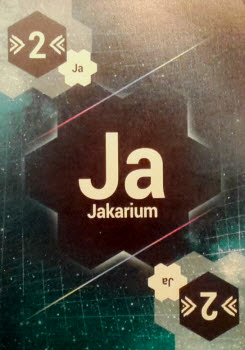
The mysterious Jakarium pulls all ships 2 spaces towards you.
Each round consists of six simple turns. That is, each player selects a card in their hand to play. Then cards are revealed simultaneously and resolved.
Movement in Gravwell is determined by the Fuel Cards; each Fuel card consists of an element name and a number from 1-10. The number indicates the spaces that the player’s ship moves. The name also has a purpose: the order that each player moves is done alphabetically.
Additionally, Fuel cards come in three forms: Normal, Repulsor, and Tractor Beam. Normal (yellow) cards are standard movement, Repulsor (purple) cards move the player away from someone, and Tractor Beam (green) cards pull all other ships towards the player instead of them moving.
However, movement in Gravwell is very atypical: a player’s ship moves in the direction of the next closest ship to them. If, for example, the next closest ship is behind, that player will move backwards. Players do have the option once per round of using an Emergency Stop ability that negates their own card though.
When each player has resolved their movement, they then select, reveal, and resolve their next card. This continues until all six cards are played, at which case the round is over. The Fuel cards are collected, shuffled, and a new round begins.
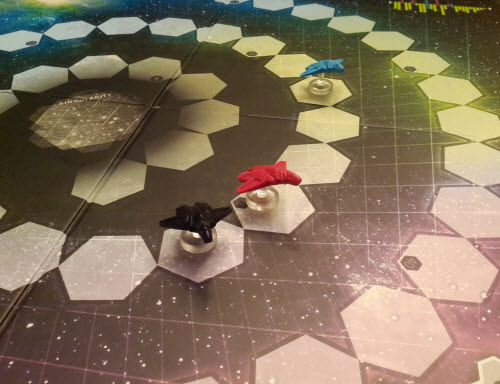
It’s Red’s turn to move. Since the Black ship is closest though, they’ll be moving backwards.
Gravwell progresses either until a player reaches the Warp Gate, or until the end of six rounds. The first player to the Gate will escape home and spend many years on the talk circuit speaking of their harrowing tale. Should no one reach the Gate after six rounds, the closest player is assumed to have escaped and is rewarded with victory.
Everyone else has a slightly grimmer fate, as they were unable to escape the pull of the Singularity. It’s likely they’ll end up just as those other derelict ships that came before them.
Binary Mechanics
At first blush, the game can almost look like a card-based Roll And Move game. But this is not Candy Land in space. Gravwell doesn’t pretend to be a highly complex or complicated game (most games only last about 30 minutes), but its central mechanic certainly will make you pause and think more than a few times on what move to take next. The system of movement – one based entirely on the proximity to other ships – is both elegant and unique. Alien even. Obviously, which card you play each turn has a major impact on where you end up, but which cards the other players use are just as important to your success.
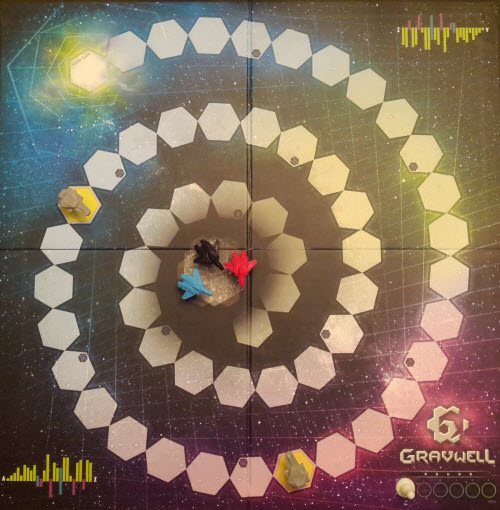
Game board (and possible hypnosis tool).
Simply playing a card at whim can be entertaining for some just to see what happens, but there is some actual considerations to make if you want to be the one making it out alive. For instance, by choosing a higher lettered element like Thorium or Yttrium, chances are you’ll be moving after some – or all – of the other players. Likewise, opting for an early initiative card like Argon or Carbon guarantees that you get to make the first move. These sort of maneuvers could be as simple as trying to ensure you go in the direction to want, but careful selection can also be used as a means to completely derail your opponent’s plans for that turn. And it is quite fun sending them spiraling backwards from victory.

The player using Dysprosium’s could easily disrupt what happens to the player using Oxygen.
As a result, at least a modicum amount of thought needs to go into deciding which card from your hand to use at what time, and Gravwell’s use of a card drafting mechanic at the beginning of each round helps players with that. The game can already be chaotic enough with how each turn pans out, and if there were no real control in which Fuel cards you get, then Gravwell truly would be little more than a Roll and Move game. By offering players a chance at selecting which cards they want to use (well, half of them anyway), not only does it help give players an active role in the game, but the jockeying for cards amplifies the fun of determining movement. As clever as proximity-based movement is, the wise use of card drafting in Gravwell is an easily overlooked aspect as to why the game works as well as it does.
Do You Feel Lucky?
Drafting cards also has a secondary effect in Gravwell: addressing the luck factor. Being able to have some say in which cards you receive allows you to select a mix of different kind of Fuel cards you may want, such as early-letter cards for quick initiative, high movement for catching up, or a Repulsor card to pad your lead. However, because of the a public selection, other players see what you take too. By knowing at least some of what other players select for cards, you are able to plan accordingly. Of course, your opponents are in the same position and may try to plan their moves around you as well.
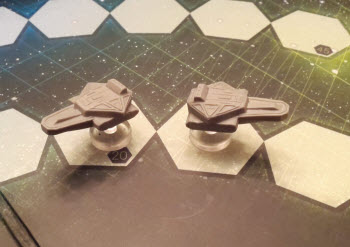
Too many wrong moves, and you’ll end up adrift like these former players.
The payoff to this public information is that Gravwell is far less luck-based than you may initially think. Indeed, one of the things that gives Gravwell its replayability beyond its novel mechanic is the scope at which you can be constantly trying to weigh your own actions against what other players will do. It’s not quite counting cards in poker, but it can have you trying to guess what your opponents will use for cards and which Fuel cards you’ll use in response.
Sometimes you’ll predict correctly and further your own ship along towards victory, or you’ll upset another player’s intended move. Other times your selection will completely work against you. This will happen, as ships constantly move backwards and forwards in an accordion-like manner towards the Warp Gate, everyone playing off one another’s gravity. (For those who may desire to mitigate luck almost entirely, though, there is a variant in the rule book that makes all of the drafted cards face up.)
Approaching the Event Horizon
Nevertheless, this blending of light strategy and careful hand management will appeal to Tacticians as a nice warm-up session towards something else. The game offers just enough planning per round to entice them into seeing the outcome. However, don’t expect it to be a game that they (or most people) will want to play repeatedly throughout the evening.
In fact, because of its unusual movement behavior and light hand planning, Gravwell works best as a wind-up game at the beginning of a game night rather than at the end of it. Playing this game tired will not only not get your ship home, but you may not make it to the halfway point.
That said, not everyone has the desire to strategize their moves and count cards. Socializers and Daredevils may try, but many within these groups will be just as content to focus on using their own cards and letting the meteors fall where they may. Luckily, because of its ease of learning, short play time, and often unpredictable turn results no matter what, Gravwell also works for them. Daredevils will especially embrace and enjoy the randomness that turns can bring.
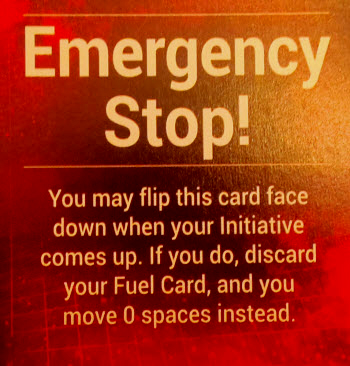 However, because of its light and abstract nature, Gravwell won’t appeal to everyone. Architects and Immersionists often sidestep abstract games because they’re usually at odds with their gaming ambitions, and Gravwell is no exception.
However, because of its light and abstract nature, Gravwell won’t appeal to everyone. Architects and Immersionists often sidestep abstract games because they’re usually at odds with their gaming ambitions, and Gravwell is no exception.
There’s nothing to build, amass, or explore in this game, and while there is enough of a thematic veneer to make the game respectable, there isn’t any real depth to theme or flavor in a way that an Immersionist desires. Both of these groups are best to just skip the game.
Similarly, Strikers won’t like how easily it is to, quite literally, fall off course as the result of things beyond their control in Gravwell, and they too may want to sit this one out.
The Takeaway
Gravwell is, at the core, a fairly light abstract movement game with just the right amount of theme to it. It isn’t a terribly deep game, but it does have some depth to it all the same with some light strategy and decision making. Arguably though, its biggest selling point is its very interesting movement mechanic, and the game is timed right so that it ends before it starts to feel repetitive. Any game that successfully explores new territory is deserving of some praise, and Gravwell fits that bill quite well. It has that decent mix of brevity and intrigue that works well for its play time, and it’s certainly the type of game that most people should try out at least once if for no other reason than to experience something different. To do that, just load up on some fuel and hop on down to your local Warp Gate.
Gravwell is a product of Cryptozoic Entertainment.
Cardboard Republic Snapshot Scoring (Based on scale of 5):
Artwork: N/A
Rules Clarity: 5
Replay Value: 3.5
Physical Quality: 4
Overall Score: 3.5
